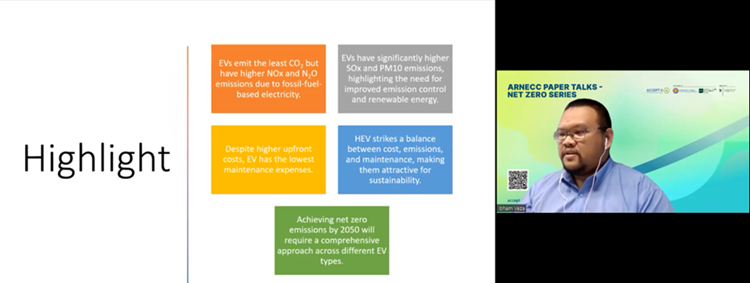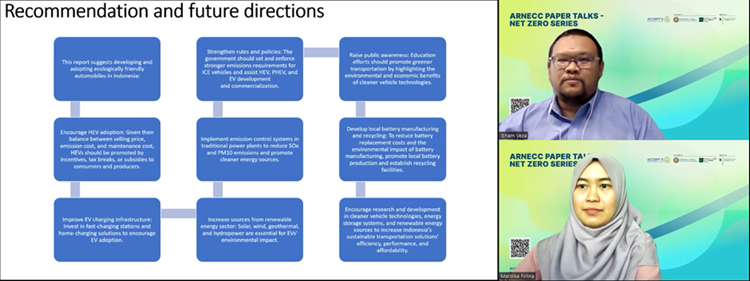Menu
On November 30th, 2023, the ASEAN Climate Change and Energy Project (ACCEPT) Phase II launched the second episode of ARNECC Paper Talks 2.0 – Net Zero Series, exploring the role of electric vehicles (EV) in achieving the Net Zero Target. Dr. Ibham Veza from Universiti Teknologi PETRONAS presented the publication titled “Electric Vehicle (EV) and Driving towards Sustainability: Comparison between EV, HEV, PHEV, and ICE Vehicles to Achieve Net Zero Emissions by 2050 from EV” with Ms. Mardika Firlina from ASEAN Centre for Energy took the role as the moderator.

Photo 1. Presentation by Dr. Ibham Veza
The webinar session led by Dr. Ibham Veza explored into a comprehensive study exploring the environmental and economic implications of various vehicle technologies, including Internal Combustion Engine (ICE) vehicles, Hybrid Electric Vehicles (HEVs), Plug-in Hybrid Electric Vehicles (PHEVs), and Electric Vehicles (EVs). Focused on the Indonesian market and aiming to achieve net zero emissions by 2050 while improving air quality, the research compared key factors such as emission costs, fueling time costs, maintenance costs, and overall vehicle viability. Notably, EVs emerged with the lowest CO and CO2 emissions, but higher NOx and N2O emissions, underscoring the challenges associated with their reliance on fossil fuels for electricity generation. The study provided valuable insights for policymakers, automotive manufacturers, and consumers, offering a roadmap for transitioning towards more sustainable transportation solutions.
In the concluding remarks, attention was drawn to key findings and future recommendations arising from the study. Noteworthy points included the identification of Hybrid Electric Vehicles (HEVs) as presenting the most balanced combination of selling price, emission cost, and maintenance cost in the Indonesian market. Recommendations encompassed the encouragement of HEV adoption through incentives, the improvement of EV charging infrastructure, and the promotion of cleaner energy sources. Strengthening rules and policies, raising public awareness, and investing in local battery manufacturing and recycling were also highlighted as crucial steps in advancing sustainable transportation solutions in Indonesia. The narrative encapsulates a holistic exploration of the study’s findings, offering actionable insights for a more sustainable and environmentally conscious automotive landscape in the country.

Photo 2. Disucssion session with Dr. Ibham Veza and Ms. Mardika Firliana
During the discussion, Dr. Ibham Veza addressed various key factors influencing the acceleration of EV adoption. Emphasizing the significance of energy sources, he highlighted Norway’s success in promoting zero-emission EVs, driven by their reliance on 100% renewable energy power plants. Discussing potential implementations in the region, Dr. Veza shed light on Sweden’s advancements in wireless charging technology beneath vehicles, acknowledging the challenges related to battery and storage but emphasizing its potential. Moreover, he suggested integrating EV education into academic curricula to prepare future experts in the field.
Regarding cost assessments, Dr. Veza recommended using GREET Software to compare total owner costs from a user’s perspective. While heavy-duty vehicles were excluded from the study, he proposed exploring this domain in future research. Addressing concerns about battery replacement costs, he revealed that 70% of an EV’s price is attributed to the battery alone and acknowledged the importance of incentives and subsidies in Southeast Asia to promote EV adoption further. The discussion also touched upon emission control systems in power plants, with Dr. Veza acknowledging their monitoring role and suggesting it as a potential area for future research. Lastly, the timeframe for EV competitiveness was debated, considering factors like internal combustion engine proponents and the timeline for achieving net-zero emissions based on electricity sources.
In conclusion, Ms. Mardika expressed gratitude to Dr. Ibham for his insights, summarizing key takeaways, including the environmental impact of different vehicle types, the potential of hybrid electric vehicles (HEVs) in the Indonesian market, and the need for improved emission control technologies. Additionally, she highlighted the ARNECC Paper Talks as an enriching forum, delving into the intricate realms of property transactions and promoting a collaborative spirit within the energy-climate sector. As they wrapped up this insightful discussion, Ms. Mardika encouraged participants to carry forward the shared commitment to excellence, efficiency, and innovation.
Join our ASEAN Researchers Network on Climate Change (ARNECC) by registering yourself here. Become a part of our collaborative efforts to address pressing climate challenges and shape a sustainable future.
Detailed information on ACCEPT II can be found at https://accept.aseanenergy.org/
We welcome any future collaboration, please feel free to contact us at [email protected]
